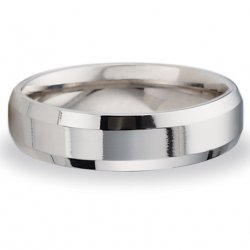Platinum - 78Pt: uses
The following uses for platinum are gathered from a number of sources as well as from anecdotal comments. I would be delighted to receive corrections as well as additional referenced uses.
Platinum is an expensive metal, even more so than gold, and this does limit its use. It was described as a precious metal as early as 1751 by Theophil Scheffer. It was used for jewellery as long ago as 1200 BC in Egyptian tombs.

A platinum wedding ring supplied by Superior Wedding Rings.
- jewellery
- wire and vessels for laboratory use
- thermocouple elements
- electrical contacts
- corrosion-resistant apparatus
- in dentistry
- platinum-cobalt alloys have magnetic properties
- coating missile nose cones, jet engine fuel nozzles
- the metal, like palladium, absorbs large volumes of hydrogen, giving it up at red heat
- in the finely divided state platinum is an excellent catalyst (such as the contact process for producing sulphuric acid). Also as a catalyst for cracking oil and as a catalyst in fuel cells and in catalytic converters for cars
- platinum anodes are extensively used in cathodic protection systems for large ships and ocean-going vessels, pipelines, steel piers
- platinum wire glows red hot when placed in the vapor of methanol - acting as a catalyst to convert the alcohol into formaldehyde. This phenomenon has been used commercially to produce cigarette lighters and hand warmers
- sealed electrodes in glass systems
- laboratory vessels, corrosion-resistant equipment
- dentistry
- currently fashionable use in antipollution devices in cars
- cis-platin, [PtCl2(NH3)2], is an effective drug for certain types of cancer such as leukaemia or testicular cancer
- platinum/osmium 90/10 alloy is used in implants such as pacemakers and replacement valves
